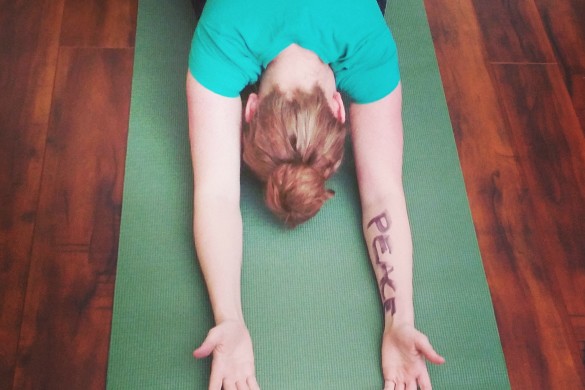Constant And Never-ending Bombardment!
Coffee is bad for you! Coffee is good for you! There’s a horrible disaster! Wow, that person died! Look at that horrible crime! You should teach your kid how to read early! Waiting to educate your kid is proven to be better! You need to buy this! Don’t be like that! Text that person back! Improve yourself! Watch this! Be involved in this! Lose weight this way! Schedule that appointment! Send that e-mail! What’s happening on Facebook? How about Instagram? What’s going on now?!
We’ve Been Conditioned
We’ve been conditioned to bombard ourselves. We have access to so much at our fingertips and our minds thirst for knowledge. We are so far beyond information overload it is not even funny. Now, it’s like second nature to reach for our phones mindlessly and check one thing or another. We have programmed ourselves that we cannot simply be, we have to occupy our minds with something, anything! What is up with that? It is definitely a learned behavior.
Why We Do This
A study by Dr. Larry Rosen shows that we check our phones every 15 minutes!!! No one is forcing us to do this but we do it. But why?
Anxiety, social fears, procrastination, fear of missing something, exhibiting OCD behavior and we have created new neural pathways that make us addicted to checking our phones. Like with any addictions, we feel pleasure and satisfaction when we do it. Additionally, we tend to use our phones as shields so we don’t have to interact with real people around us.
I also like how Daniel J Levitin, a professor of Psychology & Behavioral Neuroscience puts it. He says, “Our smartphones have become Swiss army knife–like appliances that include a dictionary, calculator, web browser, email, Game Boy, appointment calendar, voice recorder, guitar tuner, weather forecaster, GPS, texter, tweeter, Facebook updater, and flashlight. They’re more powerful and do more things than the most advanced computer at IBM corporate headquarters 30 years ago.” He also talks about how they have taken the place of about 10 other people in our lives leaving us to do it all alone. He describes how we used to have travel agents book any travel, salespeople used to help us find things in shops, etc. Now, we do it all and really the multi-tasking is not good for our brains or bodies.

Picture Credit: Daily Mail
The Consequences of Bombardment & Multitasking
Oh, bless us. We think we can do it all. That we should do it all. We have bought into a very big lie. The consequences of constantly checking our phones and bombarding ourselves with information does damage to us. Earl Miller, a neuroscientist at MIT tells us that our brains are not meant for multitasking and that it is actually counterproductive and we end up doing less.
The article goes on to say, “Multitasking has been found to increase the production of the stress hormone cortisol as well as the fight-or-flight hormone adrenaline, which can overstimulate your brain and cause mental fog or scrambled thinking. Multitasking creates a dopamine-addiction feedback loop, effectively rewarding the brain for losing focus and for constantly searching for external stimulation. To make matters worse, the prefrontal cortex has a novelty bias, meaning that its attention can be easily hijacked by something new – the proverbial shiny objects we use to entice infants, puppies, and kittens. The irony here for those of us who are trying to focus amid competing activities is clear: the very brain region we need to rely on for staying on task is easily distracted. We answer the phone, look up something on the internet, check our email, send an SMS, and each of these things tweaks the novelty- seeking, reward-seeking centers of the brain, causing a burst of endogenous opioids (no wonder it feels so good!), all to the detriment of our staying on task.”
The article goes into great detail about how we are damaging our brains and bodies. I’d encourage you to read it all in its entirety. For those that want the bottom line – Our brains don’t like it. Our bodies don’t like it. Not only do they not like it, we are causing damage to them.
I am not going to even get into the relational aspects of being on our phones all of the time….that’s a whole other article!

Creating New Neural Pathways
Recently I decided to implement a “phone fast” one day a week. Let me just tell you…the first day I did it, I kept reaching for my phone wanting to google the silliest things. I was taking my daughter and her friend ice skating and I went to reach for my phone to google “how cold is it in an ice rink?” Uh duh Kacy. It’s cold! I just picked up my phone in a mindless manner.
Mindful intention breaks the pattern and will help create new neural pathways. If your intent is not top of mind, you will revert to the same thing. The goal is to replace the almost second nature-like bombardment with something else. We are all going to be different in how this manifests in our lives. Here are some ideas that I’ve done to help replace the “phone grab”:
-I take several deep breaths
-I write in my gratitude journal
-I diffuse some essential oils
-I call a friend
-Spend time with my daughter
-Clean (I would so rather not but….)
-I stretch or do some yoga
-Pray
-Read
-Focus on a new task
You know what? On the days I “phone fast” and implement some of those strategies above, I end up feeling so much more peaceful, get so much more done and normally feel better and I sleep better at night.
We have the power to control the level of bombardment we receive. We are not victims to it.
To stay up-to-date on how life is unfolding with multiple illnesses and more, join our sleuthy community!
Are you constantly bombarding yourself with information? What is the motivation? What does your gut say?
(Note: Some links in this post are affiliate links. Read our disclosure policy here.)
















2 comments
Oh I wish I could do that. With an IT job, I sit in front of a screen literally 10-11 hours a day, and I’m pretty much on call 24/7 so my phone stays with me all the time. I wonder if this has anything to do with my insomnia? Definitely something to think about.
Hi Diane! I bet being in front of the screen contributes to your insomnia. Are you familiar with blue blockers? Many people wear them when on devices or when the sun goes down to help block the blue light that is emitted from laptops, computers, phones, televisions etc. I’m sure you wouldn’t want to wear these at work but maybe when you get home or in the evening? Here is a pair I would recommend http://amzn.to/2nO6shL. If you wear glasses, this brand also has a pair you can get that can be configured to your regular glasses. It is a cheap way to test and see if they benefit you and provide better sleep. You can also put a free app on your phone to help block the blue light. You can search your Google Play store with the phrase “blue blocker” and several options will come up for you to look at and test out. I hope this helps because sleep is a super power!